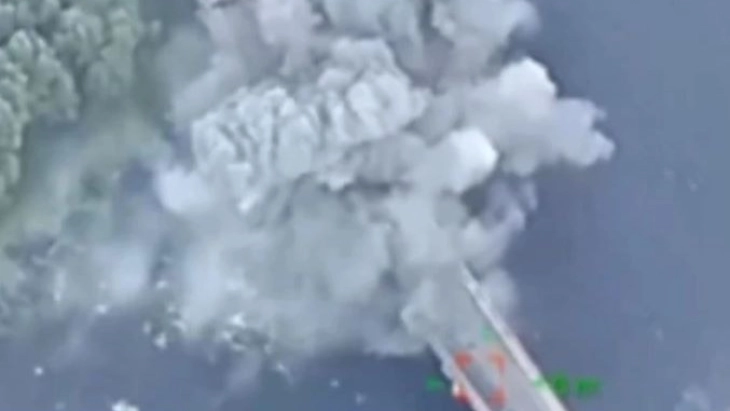Kiev reports another key bridge hit in Russia's Kursk region
- The Ukrainian air force on Sunday reported the destruction of a second bridge over the Seim River, as Kiev's ground offensive in the southern Russian region of Kursk continued.

Kiev, 18 August 2024 (dpa/MIA) – The Ukrainian air force on Sunday reported the destruction of a second bridge over the Seim River, as Kiev's ground offensive in the southern Russian region of Kursk continued.
Air force commander Mykola Oleshchuk published a video of the hit on a bridge near the village of Zvannoe, north-west of Glushkovo, where another bridge was destroyed on Friday.
"The air force is taking logistic options away from the enemy with precision strikes, which will have a considerable impact on combat operations," Oleshchuk said.
According to Russian military bloggers, only one bridge remains in the Glushkovo area for supplying Russian troops. The bridge is near the village of Karyzh, which lies 6 kilometres west of Zvannoe.
Military observer Jan Matveyev said in a video that the position of Russian troops in the area was deteriorating.
"If the Russian soldiers do not withdraw, they will be surrounded. If they do withdraw, they will leave a large area unprotected," he said.
Russia has acknowledged the destruction of the Glushkovo bridge. According to media reports, more than 30 settlements have been cut off as a result, with their residents brought to safety.
The Russian Foreign Ministry claims that the bridge was destroyed using NATO-supplied weapons.
Russia has destroyed countless Ukrainian bridges, essential parts of the country's energy infrastructure and other civilian structures during the Kremlin's all-out war, causing untold damage and casualties that far outweigh the harm caused by Ukraine's operation in Kursk.
Ukraine and Russia report renewed air attacks
Ukrainian and Russian authorities earlier reported air attacks on their respective territories on Sunday.
A Ukrainian commander said Kiev's air defences successfully repelled an overnight attack from what were believed to be Iskander-K cruise missiles, with no reports of injuries or damage.
Vassili Golubev, the governor of Russia's Rostov region on the border with Ukraine, reported that parts of an intercepted drone had fallen on a fuel depot, causing a fire in a diesel tank.
Rostov lies directly to the east of Ukraine and came under repeated drone attack overnight. An oil storage depot in the region was severely damaged at the start of the month.
Further north, Kursk Governor Alexei Smirnov reported near-constant air-raid alarms. Repair crews were in action following damage to energy infrastructure, he said.
Ukrainian forces are in control of dozens of settlements in the region to the north-east of Ukraine. Russian military bloggers reported that Ukrainian forces were seeking to improve their positions, but that the attacks had been repulsed.
They reported that the Ukrainians were using US-made HIMARS rockets and drones.
Earlier, Ukrainian President Volodymyr Zelensky said that the Kursk offensive, which began on August 6, was going to plan. Ukrainian forces improved their positions and were continuing their advance, he said.
Ukraine's unprecedented ground offensive in the Kursk area comes amid Russia's ongoing full-scale invasion, which was launched in February 2022. Kiev is seeking to force Moscow into negotiations to end the war.
Moscow rejects secret negotiations report
Moscow also rejected a report by the Washington Post newspaper about planned secret negotiations for a partial ceasefire.
"There were and are no direct or indirect negotiations between Russia and the Kiev regime on the security of critical civilian infrastructure," said Russian Foreign Ministry spokeswoman Maria Zakharova, in response to a report that the Ukrainian offensive in the Kursk region thwarted plans for such secret talks.
"Nobody foiled anything, because there was nothing that could have been foiled," said Zakharova.
The report said the talks were planned in Qatar, with the aim of halting attacks, at least against energy infrastructure.
The only contacts are between mediators on a humanitarian level, particularly for the exchange of prisoners, said Zakharova. She said Russia had also handed over children wanted by Ukrainians to their relatives via intermediaries.
Photo: X print screen







